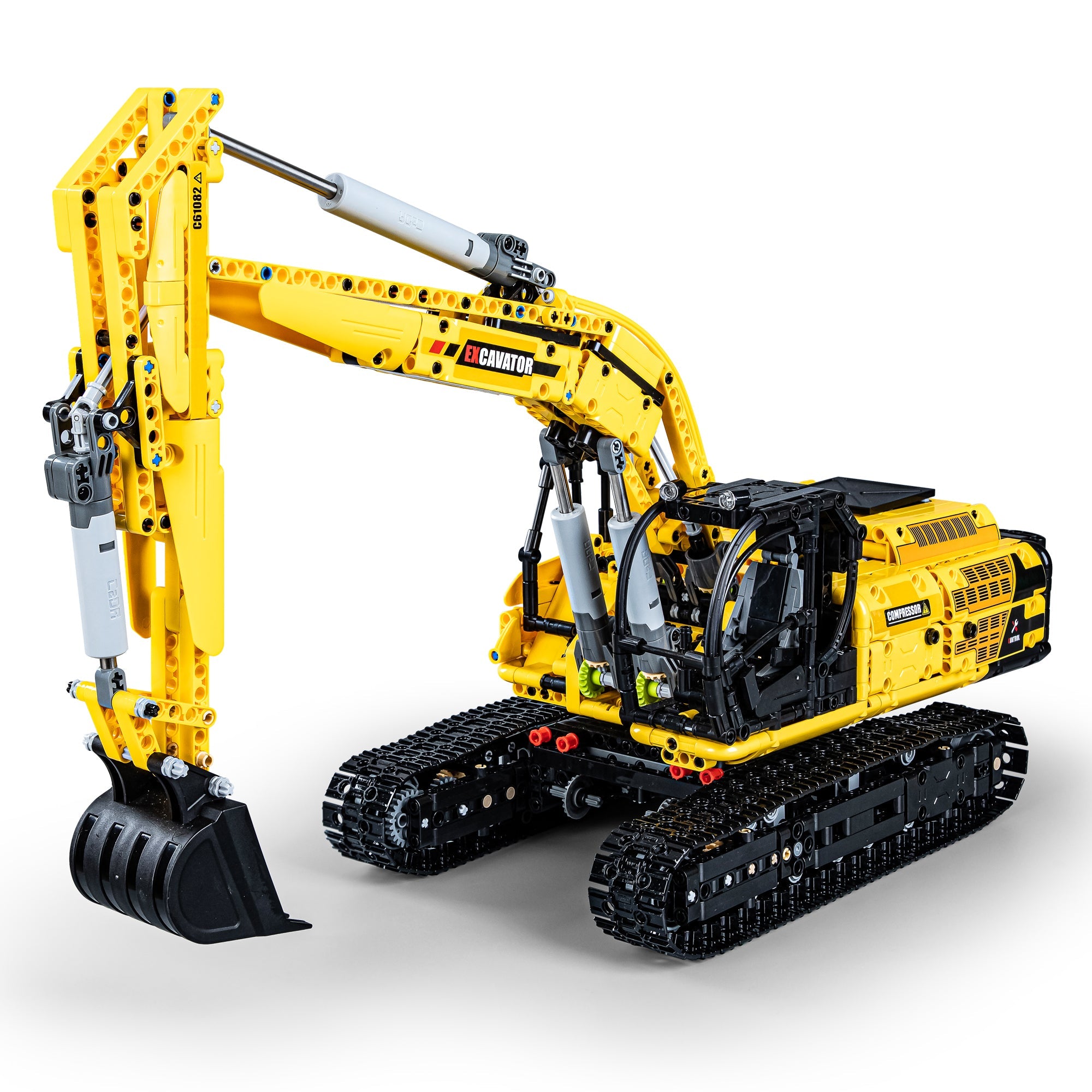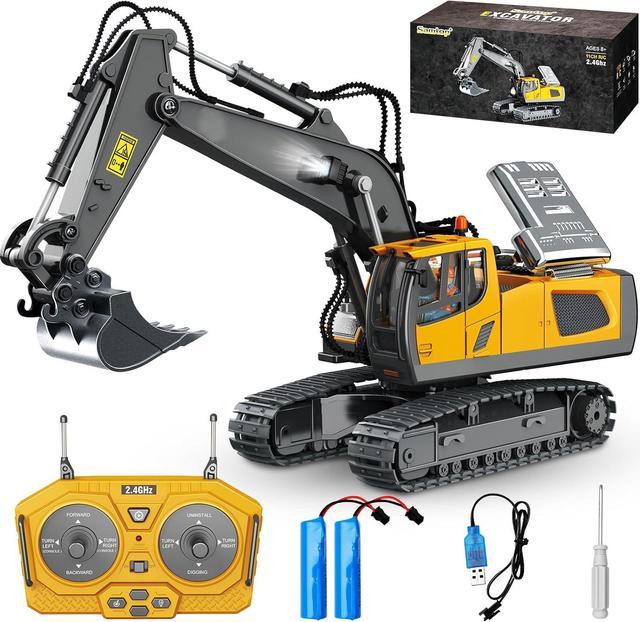Comprehending Just How Excavator Functions and Its Influence On Efficiency
Excavators play a vital duty in building and mining procedures, relying on a complex interplay of mechanical and hydraulic systems. Their capability to carry out a range of tasks rests on both their layout and the modern technology incorporated within. Recognizing these components can significantly influence functional performance and performance. As advancements remain to reshape the market, one need to think about exactly how these adjustments will affect future methods and efficiency.
The Fundamentals of Excavator Mechanics

The Role of Hydraulic Systems in Excavators
At the heart of excavator procedure exists the hydraulic system, which plays a critical function in powering the maker's features and activities. This system makes use of pressurized hydraulic liquid to move power, making it possible for various actions such as excavating, moving, and lifting. By taking advantage of the concepts of hydraulics, excavators can do jobs with impressive accuracy and pressure, enhancing overall operational efficiency.The hydraulic system includes crucial components, consisting of cyndrical tubes, valves, and pumps, which work with each other to regulate the flow and direction of the fluid. When the driver engages the controls, the hydraulic fluid is routed to details cylinders, equating the driver's commands into physical motion. This device allows for receptive and smooth activities, which are necessary in building and excavation settings. double e volvo rc excavator. The effectiveness of the hydraulic system directly impacts the performance and adaptability of the excavator, making it an important aspect in contemporary excavation processes
Trick Components of an Excavator
Understanding the key components of an excavator is crucial for realizing just how this powerful machine operates. An excavator contains numerous significant components, including the undercarriage, house, arm, bucket, and boom. The undercarriage supplies security and wheelchair, usually featuring wheels or tracks to browse numerous surfaces. Your house contains the engine and hydraulic systems, enabling the operator to control activity and power the maker. The boom expands from the residence, making it possible for upright reach, while the arm attaches to the container, helping with digging and lifting operations.Additionally, the taxicab houses the operator, furnished with controls for accurate handling. Each of these components plays an essential role in the excavator's total capability, adding to its performance and efficiency on building and construction websites. Understanding these components aids in enhancing and preserving excavator performance, guaranteeing tasks are finished safely and properly.
Attachment Versatility and Its Benefits
Add-on flexibility is an essential facet of excavators, making it possible for drivers to change in between numerous devices tailored for details tasks. This flexibility not just improves job effectiveness yet likewise adds to cost-effectiveness by reducing the demand for numerous devices. Recognizing the different kinds of accessories readily available can significantly impact the general performance and performance of an excavator on work websites.
Kinds of Attachments
While excavators are mainly identified for their excavating capacities, their real versatility hinges on the large selection of attachments available. These attachments boost the excavator's capability, permitting it to carry out various tasks beyond excavation. Usual accessories consist of containers (for excavating and scooping), hydraulic thumbs (for realizing products), and augers (for piercing holes) Grapples are utilized for managing and relocating debris, while rippers can separate hard surfaces. Various other specialized add-ons, such as trenchers and rakes, make it possible for excavators to adjust to specific job demands. This diversity not only raises the machine's utility throughout various fields, consisting of landscaping, building, and demolition, however also permits drivers to customize their equipment to meet particular task needs effectively.
Enhanced Work Efficiency
Taking full advantage of job performance is a primary advantage of making use of various excavator add-ons. Various add-ons enable an excavator to do several tasks without needing to change equipment, conserving important time and labor. For instance, using a hydraulic hammer can break concrete while a container accessory can dig deep into soil, allowing a smooth process. This convenience reduces downtime related to equipment adjustments and boosts productivity on-site. Furthermore, specialized attachments improve precision in jobs such as grading or landscape design, leading to better outcomes. The ability to adjust to various advice work demands not only simplifies procedures yet additionally decreases the requirement for extra machinery, making certain that jobs are finished swiftly and efficiently. In general, accessory convenience considerably contributes to increased task efficiency in excavation work.
Cost-Effectiveness and Convenience
Cost-effectiveness is a significant advantage of using flexible excavator add-ons. These attachments permit a single excavator to do numerous jobs, reducing the need for added equipment and labor - double e volvo rc excavator. By switching between pails, hammers, and grapples, operators can take on different jobs, from excavating to demolition, thereby making best use of equipment usage. This flexibility not only decreases functional prices but also lessens downtime related to altering equipment. Furthermore, the ability to tailor excavators with specialized add-ons enhances productivity, as they can efficiently take care of diverse jobs according to task needs. In conclusion, the combination of cost-effectiveness and adaptability in excavator accessories contributes to improved functional effectiveness and resource allowance in building and construction and excavation tasks

Advanced Innovation in Modern Excavators
Modern excavators are progressively furnished with innovative technology that changes excavation processes. Automation streamlines operations, while improved fuel performance reduces operational prices. Furthermore, wise control systems enhance precision and safety, marking a substantial evolution in excavation equipment.
Automation in Excavation Processes
As excavation innovation advances, automation has arised as an important element in improving efficiency and precision on job sites. Modern excavators are furnished with sophisticated automated systems that help with jobs such as grading, digging, and trenching with minimal operator intervention. These systems use sensors, GPS, and artificial intelligence algorithms to assure precise placing and depth control, significantly minimizing the margin for error. Additionally, automation enables drivers to concentrate on tactical decision-making as opposed to hands-on controls, leading to boosted performance generally. Such developments not just enhance workflows yet additionally improve safety by decreasing human error in complex procedures. The combination of automation in excavation processes stands for a substantial improvement in construction innovation, driving the market in the direction of better efficiency and effectiveness.
Improved Gas Effectiveness
Innovations in technology have also resulted in considerable enhancements in gas effectiveness for contemporary excavators. Modern machines are geared up with sophisticated engines that enhance power outcome while decreasing fuel usage. These engines use ingenious combustion innovations, such as turbocharging and direct fuel injection, to enhance performance and performance. In addition, light-weight products in building and construction minimize general weight, enabling for less energy expenditure throughout operation. The introduction of variable speed controls makes it possible for drivers to change engine efficiency according to certain tasks, even more reducing gas usage. Therefore, these enhancements not only reduced functional expenses but additionally add to environmental sustainability by decreasing emissions. On the whole, improved fuel efficiency in excavators is a necessary advancement that reinforces productivity and financial stability in the building industry.
Smart Control Systems
While operators browse increasingly complicated job sites, wise control systems in excavators have actually emerged as essential devices for boosting efficiency and precision. These sophisticated technologies make use of sensors and formulas to monitor various parameters such as load weight, terrain problems, and operational efficiency. By automatically readjusting hydraulic features, wise systems maximize maker efficiency, leading to improved productivity and decreased wear on components. Additionally, drivers benefit from instinctive interfaces that give real-time comments and diagnostics, enabling educated decision-making. This assimilation of technology not just improves operations however also minimizes human error, contributing to more secure work environments. As the construction industry proceeds to advance, check out here smart control systems will play an essential function fit the future of excavator efficiency and performance.
Enhancing Functional Effectiveness With Excavators
Excavators play a necessary function in enhancing functional performance across numerous building and excavation tasks. Their versatility allows for several jobs, consisting of digging, material, and lifting handling, which streamlines workflows and reduces the requirement for additional tools. With effective hydraulic systems, excavators can carry out sturdy jobs with accuracy, substantially lowering the time called for to total projects. The combination of advanced innovation, such as GPS and automated controls, better maximizes their operation, making it possible for operators to accomplish higher precision and reduce product waste. Furthermore, modern-day excavators are made to take in much less fuel and reduce exhausts, contributing to both expense savings and ecological sustainability. By making use of excavators effectively, construction groups can enhance performance, fulfill project target dates, and enhance general website administration. This multifunctionality and efficiency make excavators vital devices in the modern-day building landscape.
The Future of Excavators in Construction and Mining Industries
As the building and mining sectors evolve, the future of excavators is poised for significant transformation driven by technical advancement and altering functional demands. Advances in automation and expert system are reshaping excavator capacities, enabling improved precision and efficiency in procedures. Self-governing excavators are arising, reducing the requirement for human treatment and decreasing the danger of accidents.Moreover, the integration of telematics and IoT technology enables real-time surveillance of maker efficiency and predictive maintenance, maximizing uptime. Environment-friendly layouts, including electrical and hybrid designs, are acquiring traction, straightening with sustainability goals within the industry.Additionally, the usage of advanced materials and lighter designs boosts fuel performance while maintaining performance criteria. As these fads progress, excavators will play a crucial duty in satisfying the enhancing needs for efficiency and safety and security in construction and mining, inevitably changing operational landscapes.
Regularly Asked Concerns
Exactly How Do Climate Condition Influence Excavator Efficiency?

Climate condition greatly influence excavator performance, as rainfall and mud can hinder traction and security, while severe temperature levels may impact hydraulic systems. Operators should adapt to these variables to assure suitable capability and safety and security throughout operations.
What Precaution Should Operators Follow While Using Excavators?
Safety measures for excavator drivers consist of wearing proper personal safety devices, performing pre-operation examinations, making certain correct communication with ground personnel, preserving a risk-free range from overhead dangers, and adhering to recognized functional protocols to stop mishaps.
Exactly How Often Should Excavators Be Kept for Optimum Performance?
Excavators ought to be preserved routinely to ensure peak performance, commonly every try this 250 operating hours or as defined by the maker. Routine checks boost dependability, stop unexpected failures, and prolong the life expectancy of the tools.
What Is the Ordinary Life Expectancy of an Excavator?
The average life-span of an excavator usually varies from 10,000 to 15,000 hours of procedure. Aspects influencing long life include upkeep methods, operating problems, and the quality of the machine itself, affecting total performance and efficiency.

Can Excavators Run on Unequal Surface Efficiently?
Excavators can operate effectively on irregular surface due to their expressed styles and adjustable tracks. These attributes allow them to preserve stability and traction, enabling reliable operation in tough atmospheres typically come across in building and construction and landscape design jobs. Each of these parts plays an essential role in the excavator's general performance, contributing to its effectiveness and effectiveness on construction websites. Making best use of work effectiveness is a main advantage of utilizing numerous excavator accessories. While operators navigate progressively complicated work websites, clever control systems in excavators have actually arised as crucial tools for improving efficiency and accuracy. Excavators play an important duty in enhancing operational efficiency across different construction and excavation tasks. Developments in automation and fabricated intelligence are reshaping excavator abilities, allowing for boosted precision and effectiveness in procedures.
Comments on “Exploring the Features of a rc excavator for Enhanced Site Preparation”